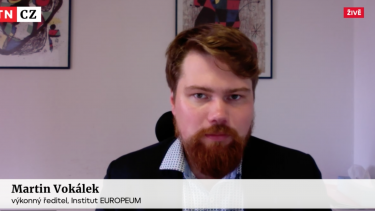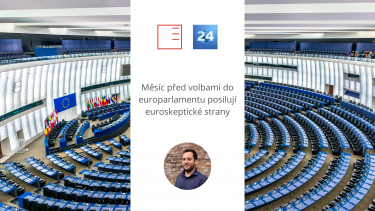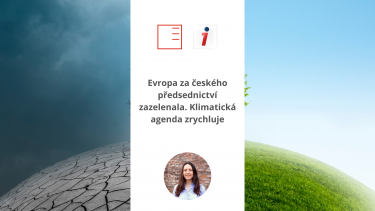TN Live | EU has approved further sanctions. They target the Russian industry and energy sector
European Union has approved its fourteenth package of sanctions against Russia, specifically targeting 116 additional individuals. Whom will the new package of sanctions affect the most? How effective have previous packages been so far? Martin Vokálek, Executive Director of EUROPEUM Institute, answered these questions live for TN Live.
Show more
ČT24 | Euroskeptic parties strengthen a month before the European Parliament elections
The European elections are about a month away. Czechs will vote for 21 of the 720 MEPs. This will be the first election since Brexit, the Covid-19 pandemic or the start of the Russian invasion of Ukraine. Turnout is expected to be higher than in the last elections five years ago, with right-wing and Eurosceptic parties strengthening. Žiga Faktor, deputy director and head of EUROPEUM Institute's Brussels office, described the possible reasons for daily broadcast of Czech TV.
Show more
RTVS | Extraordinary Summit in Brussels
The extraordinary summit in Brussels is focusing on competitiveness and the EU's strategic agenda, including the strengthening of the single market, Turkey-EU relations, Ukraine and Israel. Žiga Faktor, head of the Brussels office and deputy director of EUROPEUM Institute, commented on this for Slovak RTVS.
Show more
INVITATION | Europe in the grip of crises - What next?
We cordially invite you to a debate with Andrej Stančík on the topic "Europe in the grip of crises - What next?", which will take place on Monday 13th February at 18:00. The debate will take place in the premises of PKC (Prague Creative Centre)
Show moreRILSA: Climate policy after a year of energy crisis
Our Senior Research Fellow Kateřina Davidová published an article focusing on climate policy in the journal Forum for Social Policy. The text focuses on developments in energy and climate policy over the past year, defined by the Russian war in Ukraine, the energy crisis and rising inflation. The periodical is published by the Research Institute for Labour and Social Affairs (RILSA).
Show more
Policy Paper | The future is electric: role of Visegrad countries in the EV battery supply chain
The car industry is a crucial player for the economies of each Visegrad country, but to remain competitive adaptation is necessary. Since the shift from ICE to EVs leads to a substantial need for Critical Raw Materials (CRM), the V4 countries have and must continue to position themselves along the different parts of the EV battery supply chain from mining, refining to manufacturing, reuse and recycling as well as R&D into new battery chemistries. The future is electric: role of the Visegrad countries in the EV battery supply chain report addresses areas for Visegrad countries to ensure a sustainable and reliable EV battery supply chain.
Show more PDF
iDNES.cz: Europe has turned green during the Czech Presidency. Climate agenda accelerates
The solution to the energy problems related to the war in Ukraine and Russian gas supplies was clear to the EU. It will lie in energy savings and, above all, in clean energy sources. What will energy reform look like and what plans does the EU have? Our Senior Research Fellow Kateřina Davidová commented on the Green Deal and the impact of the Czech Presidency on this topic.
Show more
EU MONITOR | From boom to bust: How uncoordinated policies halted solar power deployment in Czechia
In his EU Monitor, Jonathan Lyons writes about the future of solar energy in the Czech Republic. "Harnessing the full potential of solar energy will not only help to meet the EU's decarbonisation targets, but also boost energy security and create local jobs. The potential for solar energy in the Czech Republic is considerable, up to 12 GW," writes Lyons.
Show more PDFCRo Plus: Mission of Reconciliation. Why are relations between France and Germany strained?
The originally scheduled regular meeting between the governments of France and Germany was eventually postponed. Could this be a signal of some major differences in relations between the countries? What are the causes of the contradictions? Are they more personal or political? What impact could it have if Paris and Berlin fail to agree on their position on China? Our senior research fellow Vít Havelka commented on the situation between the countries in the programme Odpolední Plus for Czech Radio Plus.
Show more
Staroměstské náměstí 4/1
Prague 1 - Staré Město
110 00
tel.: +420 212 246 552
email: europeum@europeum.org
https://www.europeum.org









